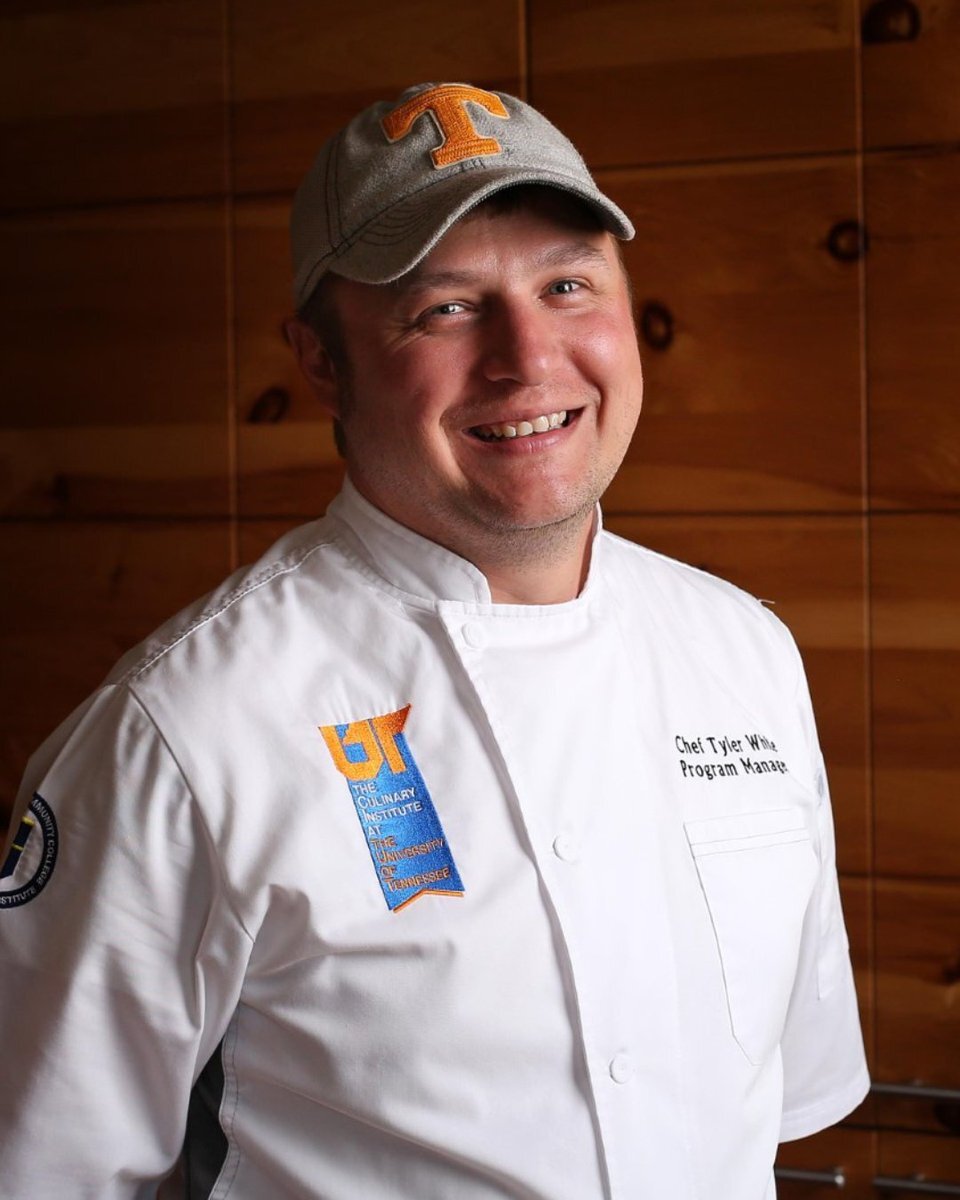by Rebekah Goode
From the moment Tyler White was tall enough to see over the counter—probably even before then—he’s been in the kitchen. It’s in his blood, a paternal inheritance.
 “When I was young, I would tag along with my father to his job at the Highland Lake Inn, a small resort near Asheville, North Carolina,” says White, who is now an assistant professor of practice and program manager for the UT Culinary Institute. “I was too young to work legally, so I would just help out in the kitchen with minor tasks to keep me busy.”
“When I was young, I would tag along with my father to his job at the Highland Lake Inn, a small resort near Asheville, North Carolina,” says White, who is now an assistant professor of practice and program manager for the UT Culinary Institute. “I was too young to work legally, so I would just help out in the kitchen with minor tasks to keep me busy.”
Originally from Ontario, Canada, White moved with his family to North Carolina in 1995 when he was 10 years old. Once he finally reached legal working age, White landed a part-time job in his father’s kitchen at the resort working nights and weekends during high school.
He continued working as a cook after graduation, but like so many in the service industry, his 60-plus-hour work weeks took their toll. He was burnt out. So much so that White—whose love of the culinary arts runs so deep that it might as well be a strand in his DNA—pivoted and began pursuing a criminal justice degree at Western Carolina University to become an FBI agent.
“I took criminal justice classes during my first semester of college and quickly said, ‘This is not for me,’” he explains. As much as he tried to shake it, White’s destiny to lead a kitchen and make a difference through food followed him around like a shadow. After his first semester, he switched his major to hospitality and tourism. He continued working in restaurants throughout college and reached a sous chef at two different clubs.
During his last semester, White found himself at an impasse. He had no idea how to move forward once he received his degree. One of his professors, who happened to be a former faculty member of the Department of Retail, Hospitality, and Tourism Management (RHTM), pulled White aside and encouraged him to pursue graduate school at UT. White applied and was offered an assistantship that allowed him to pursue his passion and hone his skills for three more years—and get paid to do it—while also learning how to teach students, both in the classroom and the kitchen.
During this time, White saw the creation of the UT Culinary Institute by his major professor, John Antun. The institute provides applied and skills-based culinary arts classes to UT students and the Knoxville community. Outside of that, the center helps identify ways to address food insecurity, provide experiential learning opportunities, and provide a context for research-oriented faculty to conduct relevant research projects.
White has been involved with the Culinary Institute since its inception—initially as someone who sourced food and assisted in the kitchen when he had time, then as a graduate teaching assistant, followed by overseeing a partnership with Pellissippi State Community College after graduating in 2010. Now, a little over a decade later, he oversees the institute entirely.
White has poured his heart and soul into his work at UT, and the campus community is reaping the benefits. He helped create and launch the groundbreaking Food4VOLS program, which fights food insecurity and food waste on campus with meals made from recovered food. He also developed and oversees the TN Believes Kitchen, a cooking program for students with disabilities, and he started the Culinary Arts Club for student enthusiasts. Most recently he created a culinary arts minor benefiting students in RHTM, nutrition, and food science.
White’s life has been made up of full-circle moments. Perhaps the most meaningful, though, is that his father was recently hired to manage the Food4VOLS program. Twenty years after working together at the Highland Lake Inn, father and son are back together, making a difference in the lives of Vols and those in surrounding communities through food.
“I hope that my work here teaches students how to take care of themselves and eat well,” says White. “I have said before that I believe my classes are some of the most important on campus. We all have to eat every day to survive, and what students learn in UT culinary classes or any volunteer opportunities they take part in through Food4VOLS will be used for the rest of their lives!”

